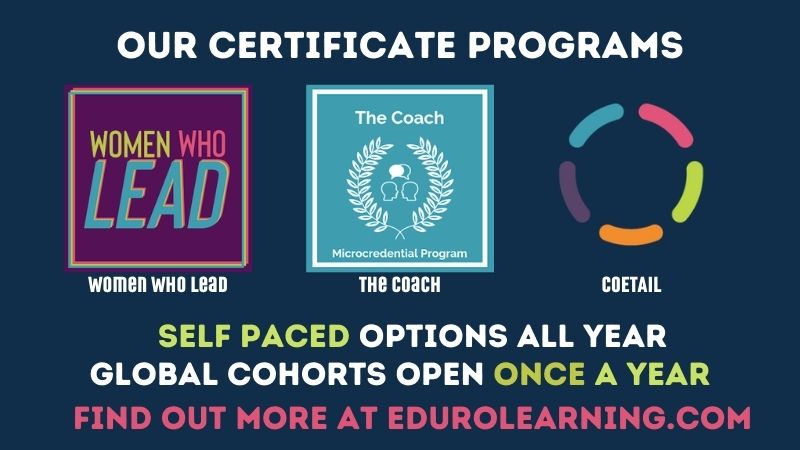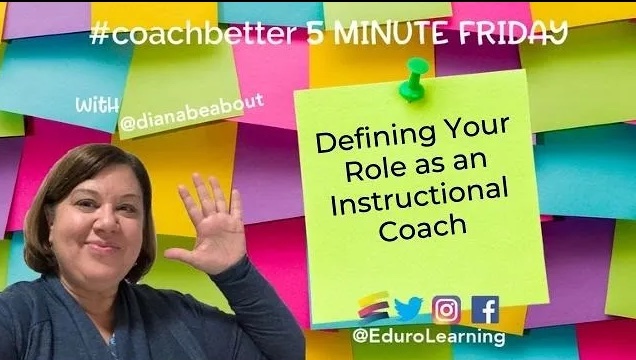In today’s guest post from Diana Beabout, she will share four considerations to effectively define the role of a coach.
A challenge for many coaches I have talked with over the years is defining their role. Of course, in some schools and organizations, the role of the coach is clearly defined and communicated to the school community. This is an ideal situation that involves discussions and decisions by stakeholders based on the needs of the school, teachers, and students – which evolve over time. However, some coaches find themselves in a bit of an ‘identity crisis’ when their role is not well defined or clearly understood by their school community. Schools bring in coaches for a variety of reasons and a coach can provide support and leadership that can help transform teaching and learning experiences. However, to be successful, the coach and the school community must have a clear understanding of the coach’s roles and responsibilities or they may find time, effort, and good intentions wasted resulting in frustration and disengagement.
In their book, Taking the Lead: New roles for teachers and school-based coaches, Joellen Killion and Cindy Harrison point out that “The differences that abound in coaching are determined by the purpose and goals of the coaching programs, the framework or approach to coaching, who does the coaching and the content of the coaching.”
To help define the role of a coach, we have to start from the bigger picture of “why” that will lead to targeting the specific work of a coach.
1:: What is the Why?
What are the purpose and goals of a coaching program in the school? This aspect needs to be addressed by school leadership to provide the foundation for developing a successful, effective coaching program for their unique needs. One place to start might be looking at the school’s mission and vision and shared goals. Being clear about the needs and goals of school will help school leadership and coaches develop a purpose for coaching. In another go-to coaching resource book I recommend, Coaching Matter’s coaching framework rubric states that schools need to establish and communicate a “clear description of the coaching program purpose, rationale, and goals or outcomes that align with district (or school) priorities.” This foundation is essential for a successful coaching program.
2:: What coaching model or approach will be most effective for the school?
Once the purpose and goals of a coaching program are established, then a coaching model or approach is needed to achieve those goals.
There are a variety of coaching models that can be used in the educational setting such as cognitive coaching, peer coaching, student-centered coaching, instructional coaching, and transformative coaching (or a combination). Especially if coaching is new for a school, leadership has to consider how the coaching model will be introduced and what expectations are for all involved. An essential condition of coaching in a school is positive relationships and the coaching model chosen, and clear communication about it, must help facilitate relationships and trust among the coach and the teachers.
3:: How does the coach’s job description match what is needed?
It’s great to have a list of responsibilities and expectations but what does that look like in practice? In their day to day work? I often refer to Joellen Killions list of the 10 roles and responsibilities of coaches which include resource provider, data coach, curriculum specialist, and learning facilitator. These roles and responsibilities can generate a discussion around what the primary roles of the coach are, which helps focus their work and should be based on the school’s coaching program goals. And over time, as goals and needs change, there needs to be regular reflection, assessment, and adjustments to the priorities of the coach’s job description.
4:: What will the coach’s work look like in practice?
Based on the goals of the coaching program, decisions need to be made on scheduling, who coaches work with, coaching cycles, documentation, and professional development (for coaches and for teachers). As shared in Coaching Matters, “When program parameters are clearly communicated, it is more likely that coaches and teachers will be better able to meet their potential and achieve the goals of the coaching program.”
Ultimately, defining and communicating the role of the coach should be a team effort and should not be left to the coach to manage on their own. There has to be purposeful and continual work on utilizing a coach for productive and meaningful work that ultimately benefits student learning. If you are a school leader and have coaches (or are thinking of bringing in a coach), I ask that you reflect on the importance of how a coach plays a part in the bigger picture of teaching and learning in our school. How well-defined and clearly communicated is the coaches role? How effective is the coaching model that is being used? How does the coach’s day to day work impact teaching and learning in your school?
If you are a coach and are struggling with your identity as a coach in your school, what discussions need to happen to clarify your role? What do you think your role should be and why? How does this match with the school’s mission and vision?
A few years ago, after talking with a number of coaches who were concerned with defining their role and it being clearly communicated with their school community, and me trying to advise them on how they could address the challenges, I realized that this responsibility can not be left to the coaches alone. So now when I talk about “defining your role as a coach”, I emphasize the need for involvement and support of leadership, educators, and the school community so that the coaches understand their purpose, the educators get the support and guidance they need, the school community is clear about the coach’s role, and, ultimately, students’ learning is impacted in a positive way.
For a deeper dive into coaching in an educational setting and information and guidance on topics such as the benefits of coaching, developing the purpose and goals of a coaching program, roles and responsibilities, coaching models & approaches, implementation, sustainability, and evaluation, and a variety of resources and protocols, I recommend…
- Coaching Matters (2nd ed) by Joellen Killion, Chris Bryan, and Heather Clifton
- Taking the Lead: New roles for teachers and school-based coaches (2nd ed) by Joellen Killion and Cindy Harrison
- Building Teachers’ Capacity for Success: A collaborative approach for Coaches and School Leaders by Pete Hall and Alisa Simeral
Please share your questions, comments, ideas and resource recommendations regarding coaching in the comments below or via Twitter @edurolearning and #coachbetter.
Watch the 5 Min Fri Video!
Level Up Your Impact with Our Certificate Programs
There are so many ways to make an impact in your school community. If you’re looking to level up your impact, either as a school leader, a coach or a teacher, explore our certificate programs: Women Who Lead, The Coach, and COETAIL. Or, if your goal is truly unique, register for a private mentoring package. If any of today’s post resonated with you, join us for the next cohort of WWL, The Coach or purchase a private mentoring package! Registration for our global cohorts opens once a year, make sure you’re on our mailing list to be notified as soon as they open! You can find all of these learning opportunities on the our website!


Recent Comments